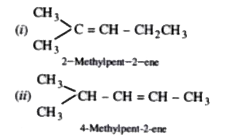An alkyl halide with molecular formula when treated with alcoholic KOH gave two isomeric alkenes, A and B. Reductive ozonolysis of the mixture gave the following compounds:
(i) (ii)
(iii) .
Write the structural formula of alkyl halide.
Video Solution
Text Solution
From the products of reductive ozonolysis, we see that the two pairs which can constitute six carbon atoms are :
(i)
(ii)
From these products, the two isomeric alkenes can be easily written below:

These two isomeric alkenes can be obtained by the dehydrohalogenation of alkyl halide (). It is possible only, if the alkyl halide is

|
Updated on:21/07/2023
Topper's Solved these Questions
Similar Questions
Knowledge Check
- Question 1 - Select One
An alkyl halide with molecular formula C6H13Br on dehyrohalogenation gives two isomeric alkenes X and Y with molecular formula C6H12. On reductive ozonolysis X and Y gives four compounds CH3COCH3, CH3CH2CHO and (CH3)2CHCHO. The alkyl halide is
A4-bromo-2-methylpentaneB3-bromo-2-methylpentaneC2-bromo-2,3-dimethylbutaneD2,2-dimethyl-1-bromobutane
A halide with formula C6H13Br gave two isomeric alkenes A and B with formula C6H12. On reductive ozonolysis of mixture of A and B following compounds were obtained CH3COCH3,CH3CHO,CH3CH2CHO and (CH3)2CHCHO. Thehalide is
View SolutionGive the IUPAC names of the following compounds :
CH3CH(CH3)CH2CH2CHOView SolutionGive the IUPAC names of the following compounds :
CH3CH(CH3)CH2CH2CHOView SolutionGive the IUPAC names of the following compounds :
CH3CH(CH3)CH2CH2CHOView SolutionWrite IUPAC name of the following compound :
CH3CH2CH(CHO)CH2COOHView SolutionWrite IUPAC name of the following compound :
CH3CH2CH(CHO)CH2COOHView SolutionWrite IUPAC name of the following compound :
CH3CH2CH(CHO)CH2COOHView Solution

